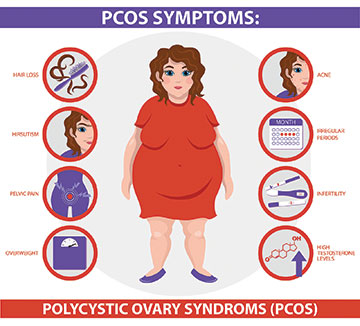By Dr. Alisha Ware
If you or someone you know has had difficulty getting pregnant, you may be familiar with polycystic ovary syndrome, or PCOS. If not, the symptoms of this condition and the potential long-term health impacts may come as a surprise. This hormonal disorder impacts women of reproductive age and can affect 6 to 12 percent (or as many as 5 million) of U.S. women, according to the Centers for Disease Control and Prevention.
Common signs and symptoms of those suffering from PCOS include irregular or missed periods, prolonged bleeding episodes, hair growth in unexpected areas, such as the face or midline of chest, and in more severe cases, unexplained obesity. Unfortunately, this condition can affect several areas of your health. People who have PCOS have a harder time getting pregnant because they do not ovulate on a regular basis. Additionally, women with PCOS tend to have high insulin levels, putting them at increased risk for Type 2 diabetes. Although this condition cannot be fixed by medicine, the menstrual issues may resolve later in life for some, but the component of increased risk for Type 2 diabetes still may persist.
If you believe that you or someone you know may be suffering from this condition, meet with your OB/GYN for an exam and lab work. From there, evaluation of an imbalance of certain hormones, including testosterone, increased insulin levels and evidence of abnormal hair growth could all be causes for concern.
The next steps for women who are suffering from PCOS may include oral contraceptives for regulating menstrual cycles, or if you are trying to get pregnant and not having success, ovulation help will be part of your treatment plan. If insulin levels are elevated, typically Metformin will be prescribed to keep those levels down.
It’s important to pay attention to this condition because it has far-reaching health consequences. Anything we can do to reduce our risk of diabetes is important, but also, people who are anovulatory (when ovulation does not occur during a menstrual cycle) over the long term may have an increased risk of endometrial cancer later in life. While it’s nice to not have a period, we must do it the right way for overall health.
Dr. Alisha Ware is a board-certified OB/GYN for Woman’s Clinic PA in Biloxi and on staff at Memorial. To reach her, call (228) 822-6368.


